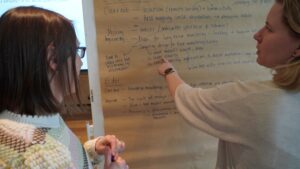Out now: Siggen Seminar 2024 Report!
From 4 – 6 of March, Marine Protected Area experts gathered at Gut Siggen in Germany to discuss how we can achieve more Effective Management of Marine Protected Areas.
Catching the wave: How can we achieve more effective management in Marine Protected Areas?
The EU Biodiversity Strategy set an ambitious target for 2030, with at least 30% of the sea area to be legally protected (with 10% of the sea area to be strictly protected) by 2030. Furthermore, it clearly identifies the urgency to ensure that all Protected Areas across Europe are effectively managed, with the realisation of conservation objectives and appropriate monitoring. As such, Marine Protected Areas (MPAs) have an important role to play and are called to make a serious effort to improve their effectiveness.
But what do MPAs need to do to reach this target, and how can progresses be monitored and assessed? What guidance, tools and methods would be helpful to improve the management of our MPAs?

Participants exchange at the 2024 Siggen Seminar
To start working on answers to these questions, exchange experience and learn from each other, 10 experts in Marine Conservation gathered at Gut Siggen in Germany. Valuable inputs were provided by expert Sue Wells, who has worked with IUCN, WWF and many other organisations on the topic of Management Effectiveness. She is currently a member of IUCN WCPA Marine Management Effectiveness Task Force.
Seminar objectives
With this seminar, we aimed to:
- Increase participant’s knowledge on why management effectiveness is at the core of EU conservation strategies;
- Share experience on main challenges that undermine effective management of MPAs;
- Acquire knowledge on some of the most common/recommended indicators to assess Management Effectiveness.
Practical approach
To ground the discussions and exercises, three case studies were used as the basis:
- Thea Hamm presented the Lower Saxon Wadden Sea National Park, Germany.
- Lasse Kurvinen presented the Bothnian Sea National Park, Finland.
- Josefine Gottschalk presented the Pomeranian Bay – Rønne Bank Nature Conservation Area.
These case studies provided real life examples of how Management Effectiveness can be implemented and were at the base of all group exercises. Group exercises focussed on the importance of indicators, monitoring and evaluation and how Management Effectiveness fits into the adaptive management cycle. Check out the report for all insights! Furthermore, all presentations and handouts can be found at the event archive page here.
EUROPARC wants to thank all participants for their active contributions. A special thanks is of course also extended to the Alfred Toepfer Stiftung for welcoming us at Gut Siggen.
